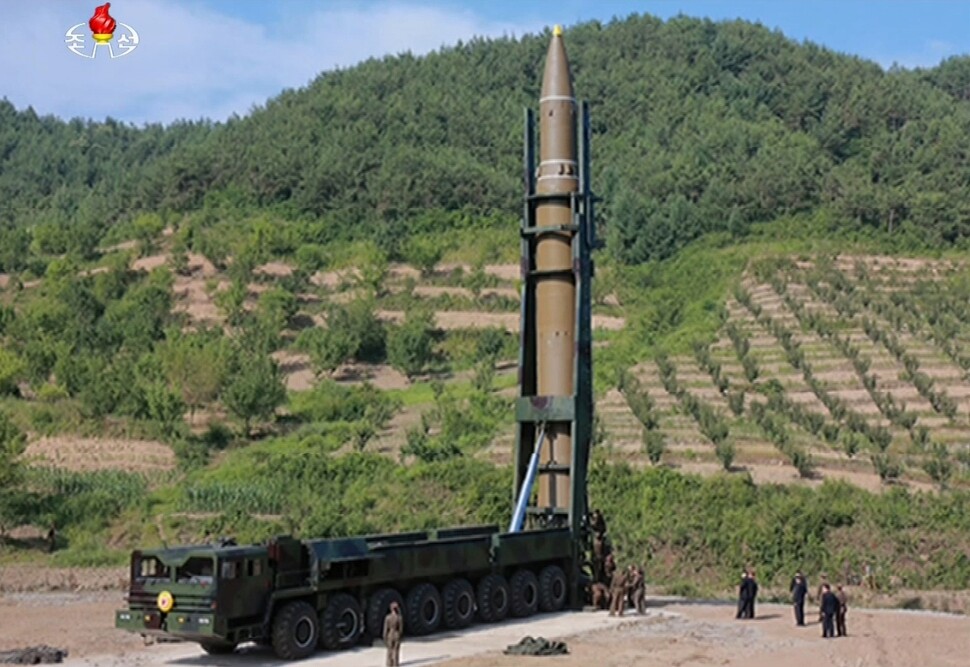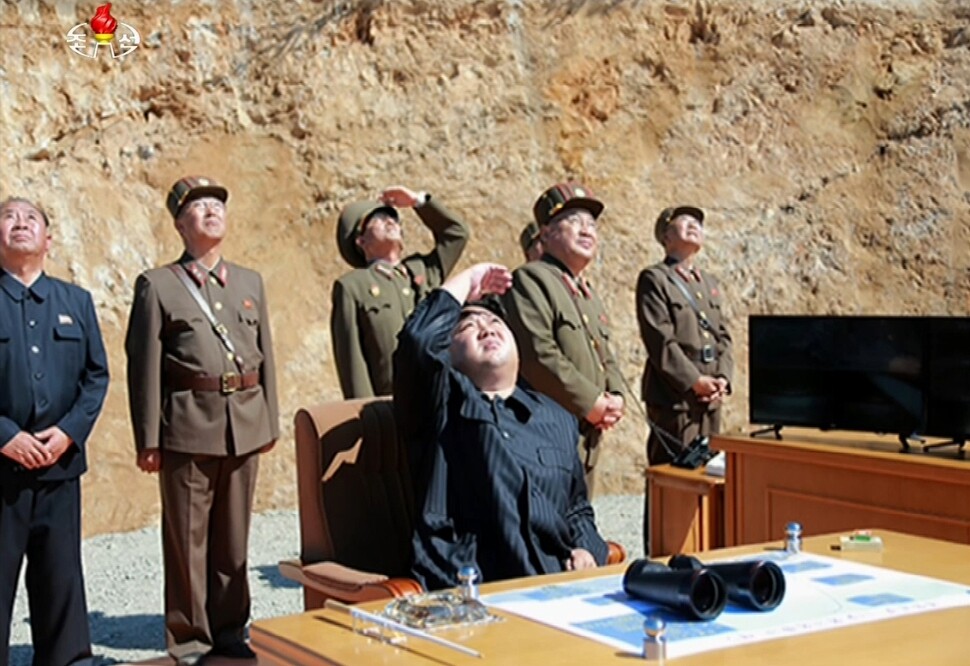hankyoreh
Links to other country sites 다른 나라 사이트 링크
North Korea’s ICBM launch comes as apparent response to recent S. Korea-US summit

North Korea’s claims on July 4 of having successfully launched a Hwasong-14 intercontinental ballistic missile (ICBM) strikes a blow against a South Korean government that was attempting to leverage the outcome of its recent South Korea-US summit to push an ambitious North Korea policy approach. For now, pressure from the international community appears certain to grow, including a possible additional UN Security Council resolution.
Pyongyang‘s claims of having successfully launched an ICBM are being seen as a response to the summit.
“At the summit, the South Korean and US leaders emphasized a combination of pressure and dialogue, while agreeing on the South Korean government taking a leading role in Korean Peninsula issues, including the North Korean nuclear program and inter-Korean relations,” explained Korea National Strategy Institute director Kim Chang-soo.
“With the strategic provocation of this ICBM launch, North Korea sent the message that it wants to negotiate directly with the US,” Kim said.
Kim explained that North Korea claimed to have “succeeded at developing an ICBM after continued tests with engine performance, re-entry technology, and increased range since last year.”
“If this is true, it can be expected to continue making provocations and raising tensions as it works militarily to increase its secondary retaliation capabilities, including improved ICBM performance and more nuclear warheads,” he predicted.

Some analysts suggested Pyongyang had made the choice to pursue dialogue with the US after securing the strategic asset of an ICBM. Thus far, the international community has implicitly viewed North Korea’s ICBM development as a “red line.” The North‘s development of an ICBM to carry the small-scale, lightweight, standardized nuclear warheads it claimed to have successfully developed with its fifth nuclear test would make it a direct military threat to the US and other countries.
“We had expected North Korea to leave the last stage of ICBM technology for later and attempt negotiation, but it seems to have opted for pursuing dialogue after securing a strategic asset first,” said Cho Sung-ryul, a supervising senior research fellow at the Institute for National Security Strategy.
Pyongyang’s claims may also be an attempt to gain the advantage in future talks by perfecting its nuclear deterrent and cementing its standing as a nuclear power. But for Seoul and the rest of the international community, the result has only been greater distrust and threats toward the North. International sanctions from the UNSC and elsewhere appear certain to intensify irrespective of Pyongyang‘s aims.
“North Korea is going to once again sense the mismatch between its own aims and the response from the international community,” predicted Inje University professor Kim Yeon-cheol.
“The relevant countries need to first establish a shared understanding of the severity of the situation and devise a range of engagement options to match the increased intensity of pressure,” Kim advised.
“More intense pressure can only really function as pressure when the terms of engagement have been made specific,” he said.
In a statement issued in the name of the Democratic Front for the Reunification of the Fatherland central committee on the morning of July 4, which marked the 45th anniversary of the South-North Joint Statement of 1972, North Korea said, “The serious lesson that we rediscover today is that nothing can be expected and nothing will change no matter how many times administrations change in South Korea or who comes to power, as long as it its policies of dependence on outside forces do not change to policies of prioritizing the [Korean] people.”
By Jung In-hwan, staff reporter
Please direct questions or comments to [english@hani.co.kr]

Editorial・opinion
![[Column] The state is back — but is it in business? [Column] The state is back — but is it in business?](https://flexible.img.hani.co.kr/flexible/normal/500/300/imgdb/original/2024/0506/8217149564092725.jpg) [Column] The state is back — but is it in business?
[Column] The state is back — but is it in business?![[Column] Life on our Trisolaris [Column] Life on our Trisolaris](https://flexible.img.hani.co.kr/flexible/normal/500/300/imgdb/original/2024/0505/4817148682278544.jpg) [Column] Life on our Trisolaris
[Column] Life on our Trisolaris- [Editorial] Penalties for airing allegations against Korea’s first lady endanger free press
- [Editorial] Yoon must halt procurement of SM-3 interceptor missiles
- [Guest essay] Maybe Korea’s rapid population decline is an opportunity, not a crisis
- [Column] Can Yoon steer diplomacy with Russia, China back on track?
- [Column] Season 2 of special prosecutor probe may be coming to Korea soon
- [Column] Park Geun-hye déjà vu in Yoon Suk-yeol
- [Editorial] New weight of N. Korea’s nuclear threats makes dialogue all the more urgent
- [Guest essay] The real reason Korea’s new right wants to dub Rhee a founding father
Most viewed articles
- 1Amid US-China clash, Korea must remember its failures in the 19th century, advises scholar
- 260% of young Koreans see no need to have kids after marriage
- 3[Column] Life on our Trisolaris
- 4[Column] The state is back — but is it in business?
- 5New sex-ed guidelines forbid teaching about homosexuality
- 6How daycares became the most viable business for the self-employed
- 7Presidential office warns of veto in response to opposition passing special counsel probe act
- 8[Reporter’s notebook] In Min’s world, she’s the artist — and NewJeans is her art
- 9Trump asks why US would defend Korea, hints at hiking Seoul’s defense cost burden
- 10OECD upgrades Korea’s growth forecast from 2.2% to 2.6%